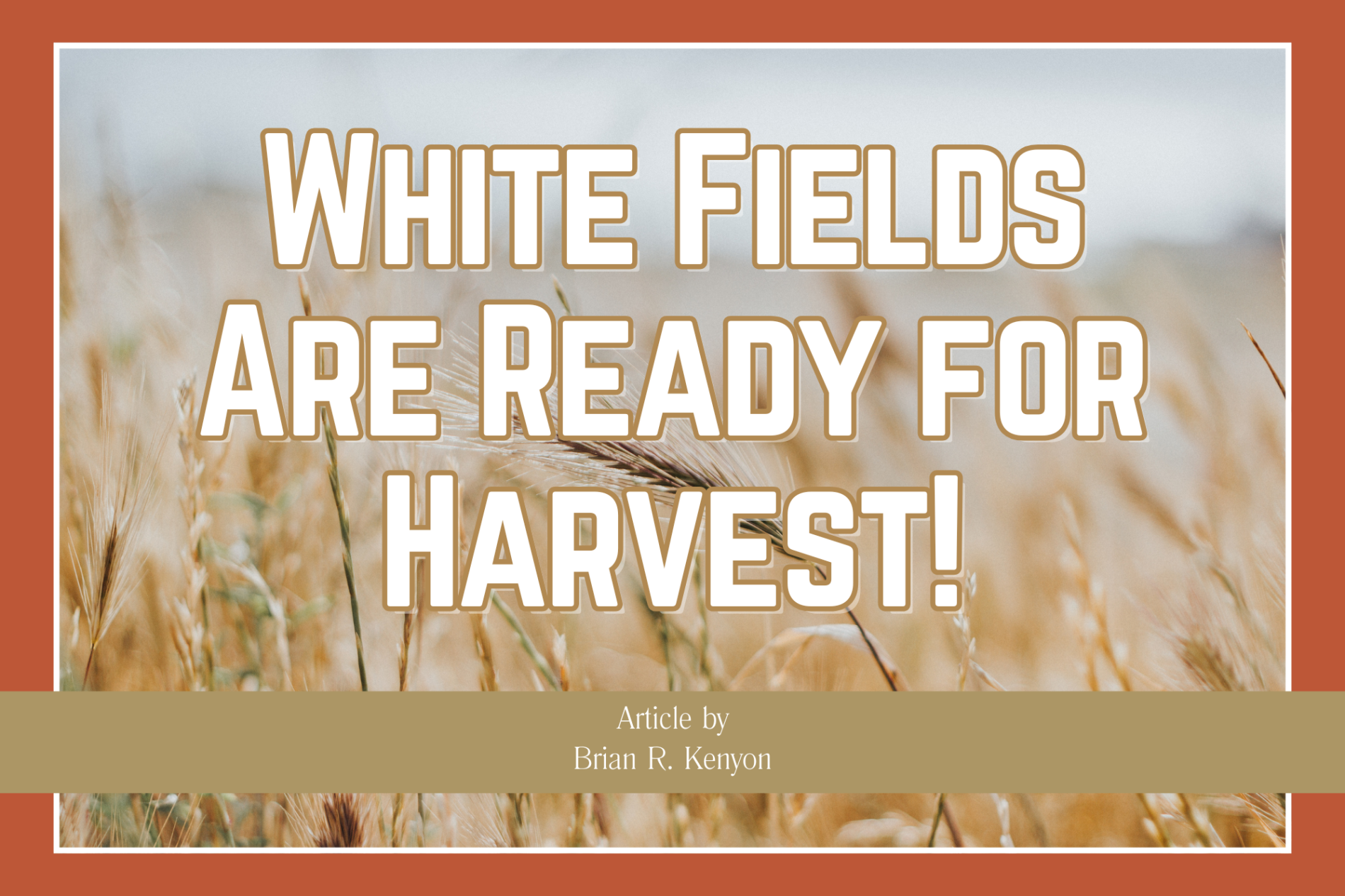By Brian R. Kenyon
Jesus’ encounter with the Samaritan woman is remarkable in several ways. One aspect to consider in this article is the part where Jesus instructed the twelve to get busy with harvesting the white fields that were made ready by the testimony of this woman. When His disciples returned from buying food (cf. Jn. 4:8), they were surprised Jesus was talking with her (Jn. 4:27).
Because people often processed Jesus’ spiritual discussions from an earthly standpoint (Jn. 4:7-15), often missing the point, the disciples’ response was predictable to Jesus’ statement, “‘I have food to eat of which you do not know.’ Therefore the disciples said to one another, ‘Has anyone brought Him anything to eat?’” (Jn. 4:32-33). Jesus took advantage of this response by teaching:
My food is to do the will of Him who sent Me, and to finish His work. 35Do you not say, ‘There are still four months and then comes the harvest’? Behold, I say to you, lift up your eyes and look at the fields, for they are already white for harvest! 36And he who reaps receives wages, and gathers fruit for eternal life, that both he who sows and he who reaps may rejoice together. 37For in this the saying is true: ‘One sows and another reaps.’ 38I sent you to reap that for which you have not labored; others have labored, and you have entered into their labors.” (Jn. 4:34-38)
From these verses, we can know what is involved in harvesting white fields.
Know Jesus
To take advantage of opportunities that await concerning white fields, we must know Jesus. There are three things we must know about Jesus. First, we must know Him Scripturally. We must know who He is according to the Bible. Many have a view of Jesus, but it is not biblical! We must know His work, or “food,” was to “do the will of Him who sent Me, and to finish His work” (Jn. 4:34). Note that obedience (“do”) was necessary for Jesus to “finish” the work God gave Him (Jn. 19:30 cf. Phil. 3:8; Heb. 5:8). Note also that Jesus was completely in harmony with the Father’s will (Jn. 5:30; 6:38; 9:4). Jesus acknowledged in His prayer, “I have glorified You on the earth. I have finished the work which You have given Me to do” (Jn. 17:4). Contrary to popular belief (based on the penitent thief, Lk. 23:39-43), Jesus could not randomly choose who would be saved, or forgiven, but those statuses was already determined by the will of God (cf. Mt. 20:23).
Second, we must know Jesus spiritually. He did not come to fill our stomachs (Jn. 6:25-27), but to satisfy our souls (Jn. 6:47-51). Thus, His offers emphasized the spiritual (cf. Jn. 4:10-14; 6:35, 51). Jesus, as “the water of life” and “the bread of life,” is all we need for spiritual life and godliness (Jn. 4:10-14; 6:35, 51)!
Third, we need to know Jesus substantially. Like physical food to our fleshly bodies, Jesus must be the nourishment of our spiritual bodies. When Jesus told His disciples, “unless you eat the flesh of the Son of Man and drink His blood, you have no life in you. Whoever eats My flesh and drinks My blood has eternal life, and I will raise him up at the last day. For My flesh is food indeed, and My blood is drink indeed” (Jn. 6:53-55), they knew what He demanded. No, Jesus was not endorsing cannibalism (cf. Lev. 26:29), but He was demanding that they would allow His will to permeate and affect every aspect of their being (cf. Mt. 22:37-40). We must know Jesus to bring the white fields to the Savior!
Sow God’s Word
From Jesus’ words to the disciples, sowing the gospel seed (cf. Lk. 8:11) first involves attentionnow. The saying, “There are still four months and then comes the harvest” (Jn. 4:35a) seems to have been a cultural saying (cf. Mt. 16:2), excusing procrastination, that indicated they had plenty of time before they needed to work. However, Jesus insisted the time to work is now, for “the fields … are already white for harvest!” (Jn. 4:35b). In another context, Jesus “was moved with compassion for them, because they were weary and scattered, like sheep having no shepherd. Then He said … ‘The harvest truly is plentiful, but the laborers are few … pray the Lord of the harvest to send out laborers into His harvest’” (Mt. 9:36-38). We must pay attention now!
Second, we can use a strategic question or two when sowing the gospel seed. Asking questions forces engagement by the one with whom we speak. Jesus did this with the disciples, “Do you not say …?” (Jn. 4:35 cf. Mt. 19:4-5; 21:24-25). Earlier, Jesus made statements that motivated the Samaritan woman to ask Him many questions, which gave Jesus opportunity to teach her multiple truths, including His Messiahship (Jn. 4:7-26).
Third, we must mention the good news. We see this with Jesus to the woman, and then with the woman to her fellow villagers. After being encouraged by the woman and spending time with Jesus, the villagers declared, “Now we believe, not because of what you [the woman] said, for we ourselves have heard Him and we know that this is indeed the Christ, the Savior of the world” (Jn. 4:42). We must sow the gospel seed (Mt. 13:3-9).
Grow God’s Harvest
To capitalize on the opportunities of white fields, we must also help grow souls. In so doing, we must first remember that future converts will be God’s sheep. Jesus declared, ““I am the good shepherd. The good shepherd gives His life for the sheep. … And other sheep I have which are not of this fold; them also I must bring, and they will hear My voice; and there will be one flock and one shepherd” (Jn. 10:11, 16). Second, we must realize there will be joy in reaping. Jesus said, “both he who sows and he who reaps may rejoice together” (Jn. 4:36). In Luke 15, that great chapter about the lost and found, every time when the lost was found, whether a sheep, a coin, or a son, there was great rejoicing (Lk. 15:6-7, 9-10, 22-23)! It is always joyful when people come to Christ, being born again through baptism (Jn. 3:3, 5 cf. Acts 2:37-38, 40-41, 47; 8:39). Third, we must help keep those who come to the Savior. When Jesus gave the great commission, He included this instruction: “teaching them to observe all things that I have commanded you” (Mt. 28:20). It is impossible to know everything before we are baptized, but that is not what God requires! Instead, He wants us to do everything we continue to learn as we are “diligent [study, KJV] to present yourself approved to God, a worker who does not need to be ashamed, rightly dividing the word of truth” (2 Tim. 2:15). As we work with new converts, we must help them study for themselves so they can apply God’s word and “be complete, thoroughly equipped for every good work” (2 Tim. 3:17). God wants all people to “be conformed to the image of His Son” (Rom. 8:29).
Second, we must realize there will be joy in reaping. Jesus said, “both he who sows and he who reaps may rejoice together” (Jn. 4:36). In Luke 15, that great chapter about the lost and found, every time when the lost was found, whether a sheep, a coin, or a son, there was great rejoicing (Lk. 15:6-7, 9-10, 22-23)! It is always joyful when people come to Christ, being born again through baptism (Jn. 3:3, 5 cf. Acts 2:37-38, 40-41, 47; 8:39).
Third, we must help keep those who come to the Savior. When Jesus gave the great commission, He included this instruction: “teaching them to observe all things that I have commanded you” (Mt. 28:20). It is impossible to know everything before we are baptized, but that is not what God requires! Instead, He wants us to do everything we continue to learn as we are “diligent [study, KJV] to present yourself approved to God, a worker who does not need to be ashamed, rightly dividing the word of truth” (2 Tim. 2:15). As we work with new converts, we must help them study for themselves so they can apply God’s word and “be complete, thoroughly equipped for every good work” (2 Tim. 3:17). God wants all people to “be conformed to the image of His Son” (Rom. 8:29).

 Alumni
Alumni Lectureship Audio
Lectureship Audio Lectureship Video
Lectureship Video
